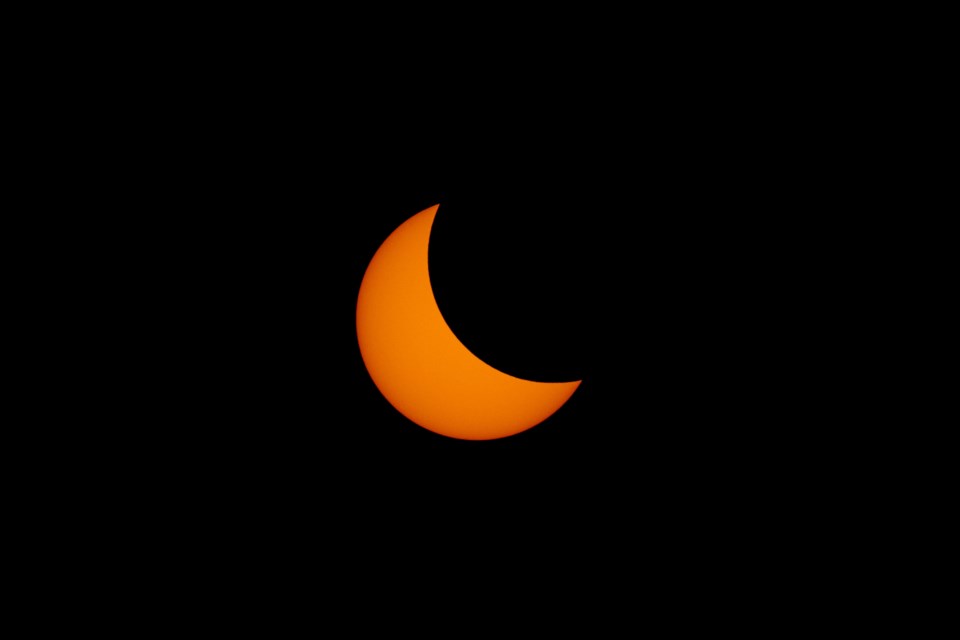If you want to see the eclipse safely on Monday the North Bay Astronomy Club is setting up with numerous viewing devices near the Rotary Pavilion at the waterfront.
Dave Roscoe is the vice president of the club, telling BayToday that there will be a variety of viewing options there.
"We have telescopes with filters on them, and we have a couple of projection systems so that you can watch the eclipse without actually looking through an eyepiece and things like that. And we'll be handing out eclipse glasses. We're actually doing this in conjunction with the Food bank."
The weather forecast for Monday is a mix of sun and cloud with a high of 13.
The club has 800 pairs of eclipse glasses and "We've just basically given them to the food bank, and they'll be set up there to exchange them for donations to the food bank. One of our guys brought that up and thought, you know, why not help the community while we're at it?"
Eclipse glasses are not hard to find if you're willing to pay. There are a number of outlets where you can buy them, but as they get rarer, and the stocks dwindle they get more and more expensive. "I've heard people paying ridiculous prices like 12 bucks for a little pair of cardboard eclipse glasses," explained Roscoe.
The club bought theirs well ahead of time from a company in the States that prints personalized eclipse glasses for events. So they always end up with overruns.
"So we always buy about 1,000 pairs of overruns at about 60 cents a pair compared to. $2 and $3 that people were paying for brand new ones. They're still new. They've never been used, they just were extras, they printed too many from a previous event."
The actual eclipse begins at about 2:07 when the moon begins to take a little bite out of the edge of the Sun, and then it reaches maximum at about 3:20. It's all over around 4:30, so it's about a 2 1/2 hour event from beginning to end. In North Bay, the moon will cover about 92 per cent of the sun. There'll still be this little sliver of sun showing on one side.
"We're planning on being at the waterfront shortly after noon because we'll have a fair bit of stuff to set up," explains Roscoe.
So how dark should you expect it to be locally?
"It should be pretty dark, I mean. The difference between a total eclipse and almost a total eclipse is quite a big difference. It's not really the same thing at all, but we should still see quite a difference. Everyone's a little bit different. I'm looking forward to seeing what it will be like for myself. Remember in 2017 I think we had about 70 per cent coverage and it was perceptibly dimmer. It started to feel kind of like it was later in the day, like it was getting close to sunset, except that it's a weird kind of light, It's not the same as sunsets, it's just the dimming down."
Roscoe encourages everyone to come out to their free event and view the eclipse in safety.
"Absolutely yes. It's not safe to look at the sun at any time and there's there's lots of, old-school type ideas, you know, looking through a CD or looking through overexposed film or blackening a piece of glass with a candle." None of those are recommended.
Excitement is also growing among club members.
"Yes, we're fairly excited. We always enjoy this kind of stuff. It's an opportunity for you to talk to a bunch of astronomers. They've all learned things about eclipses and the birth of stars or whatever, and they're all just dying to share what they've learned with the public. That's what attracted me. The fact that all these guys are in the Astronomy Club and we're just just waiting for somebody to ask questions. This is an ideal opportunity for us to do that kind of outreach, I would say it's probably at least half of what we do as a club is trying to help educate and spread information."
The eclipse has also piqued interest in the club itself, with numerous calls.
"An increase in inquiries, yeah. People are definitely interested and you know most people will probably remember, either the last eclipse or one that they saw as a child or something like that. But they're all different, so it's always interesting to compare notes with other people's experiences and stuff. Some of our people have been to total eclipses and they're addicted. So when there's an eclipse going on they travel to the point of totality. They go there rather than hang around in North Bay. Some of our members are going to Mexico, some are just heading down to the Niagara region where they will get totality.
Roscoe's final advice boils down to common sense.
"Don't try looking directly at the sun, especially don't try looking at the sun through your binoculars or anything like that unless you have an approved filter system on your equipment,"
